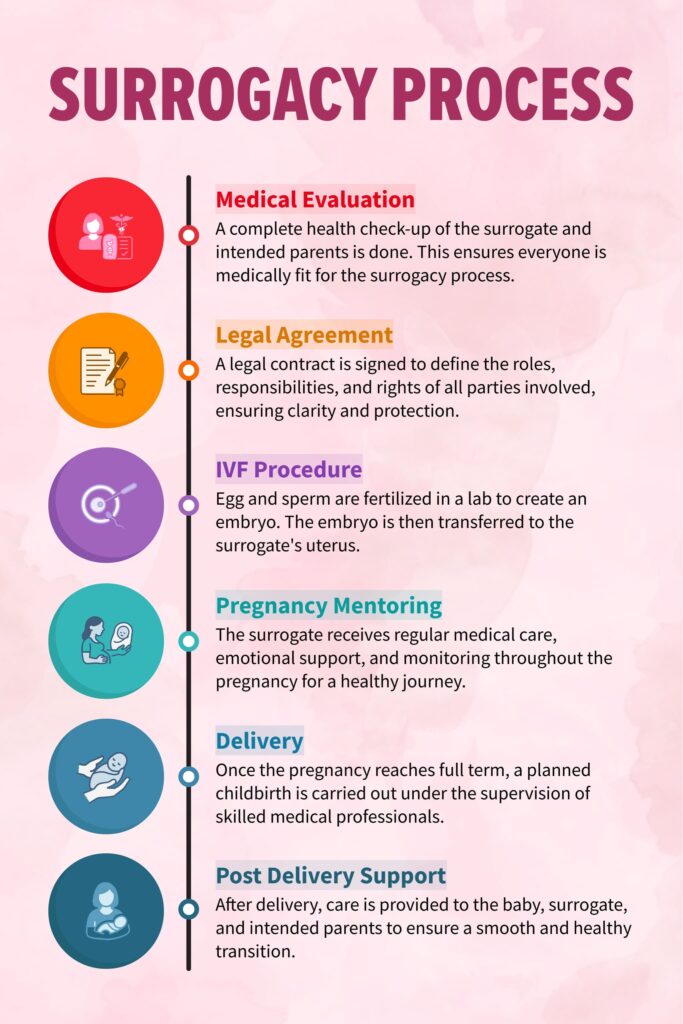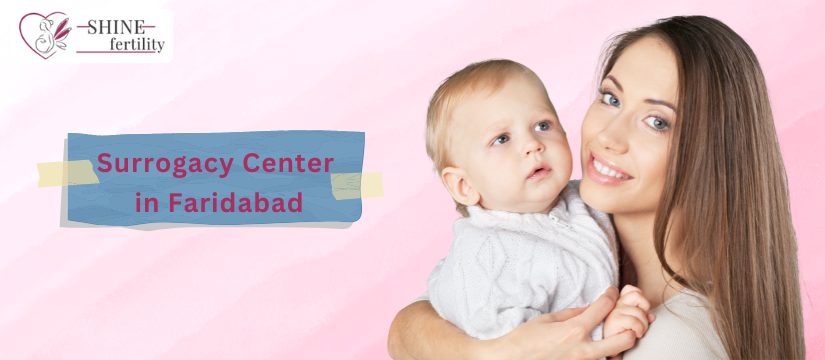Surrogacy, a form of assisted reproductive technology, offers a path to parenthood for individuals or couples who are unable to conceive or carry a pregnancy to term on their own. In this process, another woman carries and gives birth to a child for the intended parents. India has witnessed a growing social acceptance and legal recognition of surrogacy, providing hope to many facing infertility challenges.
While the legal landscape continues to evolve, surrogacy remains a significant option for those seeking to build a family. The emotional journey involved is often profound, and the availability of surrogacy services in cities like Faridabad plays a crucial role in fulfilling the dreams of parenthood.
Faridabad, situated in the National Capital Region (NCR), is increasingly becoming a notable destination for fertility treatments, including surrogacy. Various fertility centers and hospitals in the city offer these specialized services, catering to the growing demand. The primary type of surrogacy practiced here is gestational surrogacy, where the surrogate mother has no genetic connection to the child she carries.
The embryos are created using the intended parents’ (or donors’) eggs and sperm and then transferred to the surrogate’s uterus. The presence of multiple centers in Faridabad suggests a dynamic and competitive environment within the fertility service industry. This competition can potentially benefit intended parents by providing a wider array of choices and diverse service offerings, allowing them to find a center that best meets their individual needs and preferences.
Understanding the Surrogacy Journey: From Start to Finish

The surrogacy process begins with the selection and thorough medical screening of a suitable surrogate mother. Once a match is confirmed, legal contracts are signed to protect the rights and responsibilities of all parties involved. Following this, the intended mother or an egg donor undergoes IVF to create embryos. These embryos are then transferred to the surrogate’s uterus. Hormonal support is provided to the surrogate to ensure the uterus is ready for implantation, and a pregnancy test is conducted around 10–14 days after the embryo transfer.
If the pregnancy is confirmed, the surrogate receives regular prenatal care and medical supervision throughout the pregnancy to ensure the health and well-being of both the baby and herself. The intended parents are usually involved in the journey, maintaining communication and offering support. After delivery, the baby is handed over to the intended parents, and legal procedures are completed to establish parentage. The entire process is guided by experienced fertility specialists, legal experts, and counselors to ensure a smooth and ethical journey for everyone involved.
Why Faridabad is Emerging as a Fertility Hub
Faridabad’s emergence as a fertility hub can be attributed to several key factors. Its geographical advantage, being part of the well-connected National Capital Region, makes it easily accessible for individuals and couples seeking surrogacy services, both from within India and internationally.
The city benefits from the NCR’s overall established reputation for advanced healthcare facilities and medical tourism. Furthermore, Faridabad boasts a well-developed infrastructure, including various transportation options and accommodation choices for those traveling for treatment.
Another significant factor contributing to Faridabad’s popularity is the potential for more cost-effective surrogacy treatments compared to other major metropolitan cities or international destinations. While specific cost comparisons for Faridabad are somewhat limited in the available information, India, in general, is recognized as a more affordable destination for medical tourism, particularly for procedures like surrogacy. This cost-effectiveness can be a major draw for intended parents, especially considering the substantial financial investment involved in the surrogacy process.
The availability of experienced fertility specialists and advanced medical facilities further solidifies Faridabad’s position as a growing fertility hub. The city is home to skilled fertility doctors, embryologists, and support staff who possess the necessary expertise to handle complex surrogacy cases.
Clinics in Faridabad are also equipped with advanced assisted reproductive technologies (ART) and maintain high standards of medical infrastructure, ensuring that intended parents have access to quality treatment and care. Patients often seek out centers that demonstrate a proven track record of success and utilize modern technology to maximize their chances of a successful pregnancy through surrogacy.
Success Rates of Surrogacy in Faridabad

The surrogacy success rate in Faridabad is generally considered to be high, with average success rates ranging between 75% to 90%. This impressive rate is largely attributed to the use of advanced reproductive technologies such as IVF and ICSI, along with improved embryo freezing techniques and preimplantation genetic testing (PGT). These advancements have significantly increased the chances of a healthy pregnancy and live birth through surrogacy.
Several factors contribute to the success of surrogacy, including the age and health of the intended parents or donors, the quality of embryos, and the medical expertise of fertility specialists. Faridabad has emerged as a reliable destination for surrogacy treatments, offering hopeful parents a good chance of achieving their dream of parenthood through personalized care and state-of-the-art medical support.
Surrogacy Services and Cutting-Edge Technologies Offered
Surrogacy centers in Faridabad offer a comprehensive range of assisted reproductive technologies (ART) to cater to the diverse needs of individuals and couples facing infertility. Among the most commonly available procedures is In Vitro Fertilization (IVF), a process where eggs are retrieved from the ovaries and fertilized by sperm in a laboratory, with the resulting embryos then transferred to the surrogate’s uterus.
Intracytoplasmic Sperm Injection (ICSI) is another advanced technique often employed, involving the direct injection of a single sperm into an egg to facilitate fertilization. Intrauterine Insemination (IUI), a less invasive procedure, involves placing prepared sperm directly into the uterus around the time of ovulation. The availability of these different ART methods ensures that clinics can address various underlying causes of infertility and tailor treatment plans to individual circumstances.
In addition to these core ART procedures, surrogacy centers in Faridabad also provide essential gamete and embryo donation services.
- Egg donation programs offer a solution for women who cannot produce viable eggs.
- Sperm donation assists individuals or couples facing male factor infertility.
- Embryo donation is another option for those who may not be able to use their own gametes. Clinics like Ekmi Fertility have well-defined criteria for egg donor screening and provide compensation to donors, ensuring a thorough and ethical process. Access to these donation services significantly broadens the possibilities for intended parents who may require third-party assistance to achieve their dream of parenthood.
Cryopreservation techniques are also widely available at surrogacy centers in Faridabad. These techniques allow for the freezing and storage of eggs, sperm, and embryos.
- Egg freezing offers women the option to preserve their fertility for the future.
- Sperm freezing can be beneficial for men undergoing certain medical treatments or facing progressive conditions.
- Embryo freezing allows for the storage of surplus embryos created during an IVF cycle, which can be used for subsequent transfer attempts, providing flexibility and potentially reducing the need for repeated ovarian stimulation.
Furthermore, many surrogacy centers in Faridabad offer advanced procedures and technologies to enhance the chances of successful outcomes.
- Preimplantation Genetic Screening (PGS) and Preimplantation Genetic Diagnosis (PGD) are used to screen embryos for genetic abnormalities before transfer, increasing the likelihood of a healthy pregnancy.
- Other advanced technologies such as laser-assisted hatching, which can aid in embryo implantation, and Embryoscope, which allows for continuous monitoring of embryo development, are also available in some clinics. The adoption of these cutting-edge technologies and the maintenance of high laboratory standards reflect the commitment of surrogacy centers in Faridabad to providing the best possible care and maximizing success rates for intended parents.
The Cost Factor: Understanding Surrogacy Expenses in Faridabad

The financial aspect is a significant consideration for individuals and couples contemplating surrogacy. The total cost of surrogacy in Faridabad can vary depending on several factors, including the chosen clinic, the specific services required, and any unforeseen complications that may arise.
Ekmi Fertility mentions a broad cost range for their surrogacy treatments, from Rs. 4 lakhs to Rs. 18 lakhs. Other clinics in the region also provide estimates for surrogacy expenses. Doctor Today IVF and Multispeciality Hospital quotes a surrogacy cost of approximately Rs. 1,400,000, while Seeds of Innocence estimates around Rs. 1,600,000. Medicover Fertility Centre’s surrogacy cost is also mentioned as Rs. 1,400,000.
Select IVF provides a cost range of Rs. 15 Lakh to 18 Lakh for surrogacy using the intended parents’ own eggs and sperm. Fertilityworld indicates a general surrogacy cost between Rs. 15 lakhs and Rs. 20 lakhs. These figures highlight the variability in surrogacy costs across different centers in Faridabad.
The overall expense of surrogacy can be broken down into several key components. These typically include the costs associated with medical procedures such as IVF and embryo transfer. A significant portion of the cost involves the surrogate mother’s compensation and her related expenses, which can cover accommodation, food, and medical care throughout the pregnancy. Legal fees are also a necessary part of the process, covering the drafting and execution of surrogacy agreements and other legal documentation.
Medications and supplements for both the intended mother (if applicable) and the surrogate mother contribute to the overall cost. If donor eggs or sperm are required, the associated costs for screening and compensation will also need to be factored in. Hospitalization and delivery charges incurred during the birth of the child are another significant expense.
Additionally, insurance coverage for the surrogate mother is often mandated to cover any medical complications during or after the pregnancy. Finally, if intended parents choose to work with a surrogacy agency, the agency’s fees will also be included in the total cost.
Several factors can influence the final cost of surrogacy in Faridabad.
- The specific pricing structure of the chosen clinic will play a major role.
- The need for donor eggs or sperm will add to the overall expenses.
- The number of IVF cycles required to achieve a successful pregnancy can also impact the total cost.
- Any unforeseen medical complications that the surrogate might experience during her pregnancy could lead to additional expenses.
- The type of delivery, whether it is a normal vaginal delivery or a Cesarean section, can also affect the cost.
- Furthermore, opting for a guaranteed surrogacy program, which often includes multiple attempts and comprehensive coverage, might have a different pricing structure compared to a standard surrogacy arrangement.
To provide a clearer picture of the potential financial outlay, the following table presents an estimated cost breakdown for a surrogacy cycle in Faridabad based on the information available:
| Expense Category | Estimated Cost Range (INR) | Notes |
| Medical Procedures (IVF, Embryo Transfer) | ₹3,00,000 – ₹5,00,000 | Varies depending on the number of cycles and specific techniques used. |
| Surrogate Mother’s Compensation & Expenses | ₹4,00,000 – ₹6,00,000 | Includes accommodation, food, medical care, and compensation. |
| Legal Fees & Documentation | ₹1,00,000 – ₹2,00,000 | Covers contract drafting and legal consultations. |
| Medications & Supplements | ₹50,000 – ₹1,00,000 | For both intended parents (if applicable) and the surrogate. |
| Egg/Sperm Donor Costs (if required) | ₹65,000 – ₹2,50,000 | Depends on the donor’s profile and the clinic’s charges. |
| Hospitalization & Delivery Charges | ₹2,00,000 – ₹4,00,000 | Can vary based on the type of delivery and hospital facilities. |
| Surrogate Insurance | ₹50,000 – ₹1,00,000 | Coverage for pregnancy-related complications. |
| Agency Fees (if applicable) | ₹1,00,000 – ₹3,00,000 | Depends on the agency’s services and pricing. |
| Total Estimated Cost | ₹12,65,000 – ₹24,50,000 | This is an estimated range; actual costs can vary. |
It is essential for intended parents to obtain detailed cost breakdowns from the specific surrogacy centers they are considering to have a clear understanding of the financial commitment involved.
Choosing the Right Path: Key Considerations for Selecting a Surrogacy Centre
Selecting the right surrogacy center is a critical decision that can significantly impact the overall experience and outcome for intended parents. A comprehensive checklist of crucial criteria should be considered during this process.
- Success Rates: Inquire about the clinic’s success rates specifically for surrogacy and for cases similar to your own.
- Expertise and Experience: Look for qualified and experienced doctors, embryologists, and support staff with a compassionate approach.
- Infrastructure and Facilities: Evaluate the clinic’s technology, laboratories, and overall environment.
- Range of Services: Ensure the center offers comprehensive services, including ART, donation options, cryopreservation, and legal support.
- Transparency in Costs: Choose a clinic that provides a clear and detailed breakdown of all expenses.
- Patient Reviews and Testimonials: Read reviews and, if possible, connect with previous patients to gain insights into their experiences.
- Legal and Ethical Practices: Verify that the clinic complies with the Surrogacy (Regulation) Act, 2021, and follows ethical guidelines.
- Counseling and Support Services: Opt for a center that offers counseling for both intended parents and surrogate mothers.
- Communication and Responsiveness: Assess the clarity, promptness, and empathy of the clinic’s communication.
- Accreditation and Recognition: Check if the clinic is accredited by relevant medical organizations.
By carefully considering these key criteria, intended parents can make an informed decision and choose a surrogacy center in Faridabad that best suits their individual needs and will support them throughout their journey to parenthood.
Navigating the Legal and Ethical Landscape of Surrogacy in Faridabad
Surrogacy practices in Faridabad, like the rest of India, are governed by the Surrogacy (Regulation) Act, 2021, along with its subsequent amendments. This Act establishes a legal framework for surrogacy arrangements, aiming to protect the rights of surrogate mothers, intended parents, and the children born through surrogacy.
A key provision of the Act is the prohibition of commercial surrogacy, allowing only altruistic surrogacy where the surrogate mother receives no financial compensation beyond medical expenses and insurance coverage.
The Act also sets forth specific eligibility criteria for intended parents. Currently, surrogacy is permitted for:
- Heterosexual Indian married couples who have been medically certified as infertile.
- Single women who are widows or divorcees between the ages of 35 and 45. Additionally, the surrogate mother must meet certain criteria, including:
- Being a close relative of the intended couple.
- Being married with at least one child of her own.
- Being between 25 and 35 years of age.
- Having been a surrogate only once in her lifetime. Recent amendments to the Surrogacy (Regulation) Rules, 2022, have allowed for the use of donor gametes (egg or sperm) if one partner in the intending couple has a medical condition necessitating it, provided this is certified by a District Medical Board. However, the child born through surrogacy must have at least one gamete from the intending parents.
Beyond the legal regulations, ethical principles and guidelines are crucial in governing surrogacy practices. These principles emphasize:
- The well-being and autonomy of the surrogate mother, ensuring she makes an informed decision without coercion.
- The rights and best interests of the child born through surrogacy.
- The prevention of any form of exploitation. The National Surrogacy Board plays a significant role in laying down the code of conduct that surrogacy clinics must adhere to, ensuring ethical standards are maintained across the country.
For surrogacy centers and intended parents in Faridabad, these national laws and ethical guidelines are directly applicable. Surrogacy clinics operating in Faridabad must be registered under the Surrogacy (Regulation) Act, 2021. The ban on commercial surrogacy means that only altruistic arrangements are legally permissible in the city.
The recent allowance for the use of donor gametes under specific medical conditions has broadened the options for some intended parents in Faridabad who may require this assistance.
Navigating this legal and ethical landscape requires careful attention to the specific provisions of the Surrogacy Act and a commitment to ethical conduct from all parties involved. Seeking guidance from legal professionals specializing in surrogacy law is highly recommended to ensure full compliance and a smooth journey to parenthood.
FAQ
Q1. Is surrogacy 100% successful?
No, surrogacy is not 100% successful. Success depends on factors like the health of the surrogate, the quality of eggs and sperm, and the IVF process.
Q2. Who is eligible for surrogacy?
Surrogacy is available to legally married Indian couples who are infertile. Single individuals, unmarried couples, and foreign nationals are not eligible under current Indian law.
Q3. Is surrogacy pregnancy risky?
Surrogacy carries similar risks to any pregnancy. However, with proper medical care and monitoring, these risks can be minimized for both the surrogate and the baby.
Q4. Is there free surrogacy?
Free surrogacy is rare. Surrogates are typically compensated for their medical expenses and basic living costs. Commercial surrogacy (excessive compensation) is banned in India.
Q5. Is surrogacy painful?
Surrogacy involves the usual discomforts of pregnancy, but it is not inherently more painful than any other pregnancy. IVF procedures may cause mild discomfort, but pain varies from person to person.
Q6. Whose egg is used in surrogacy?
In gestational surrogacy, the egg used is typically from the intended mother or a donor, not the surrogate, as she is not genetically related to the child.

